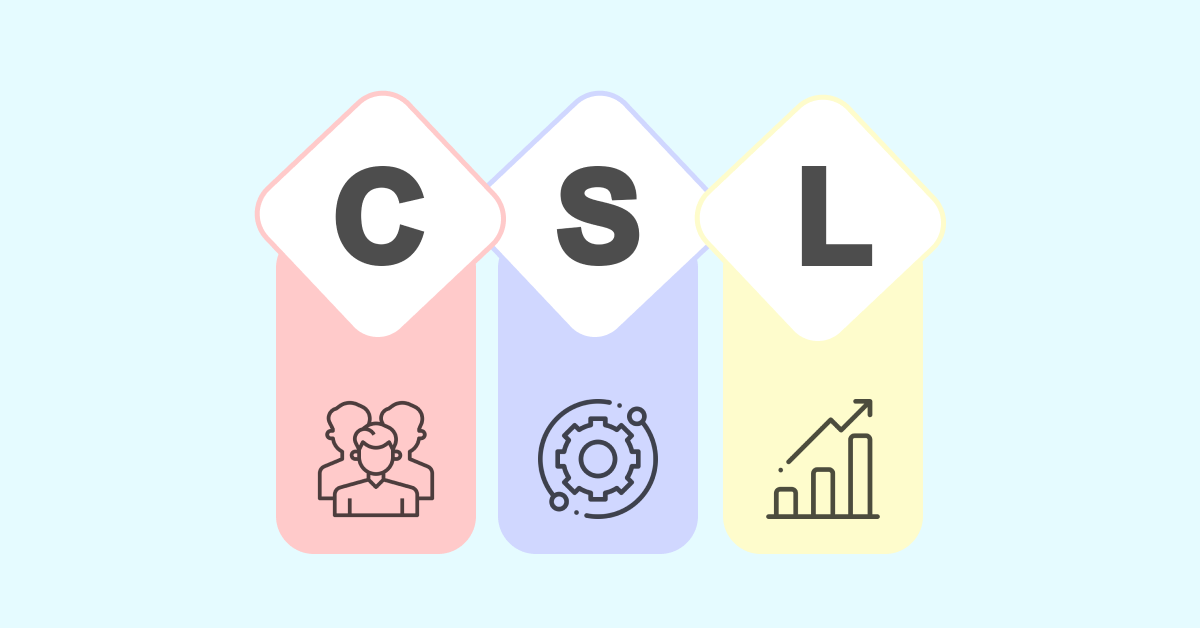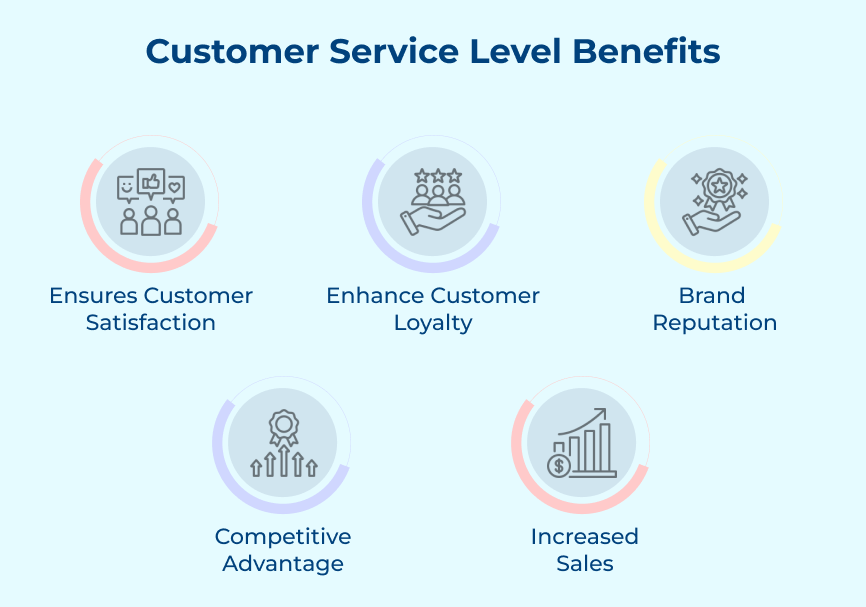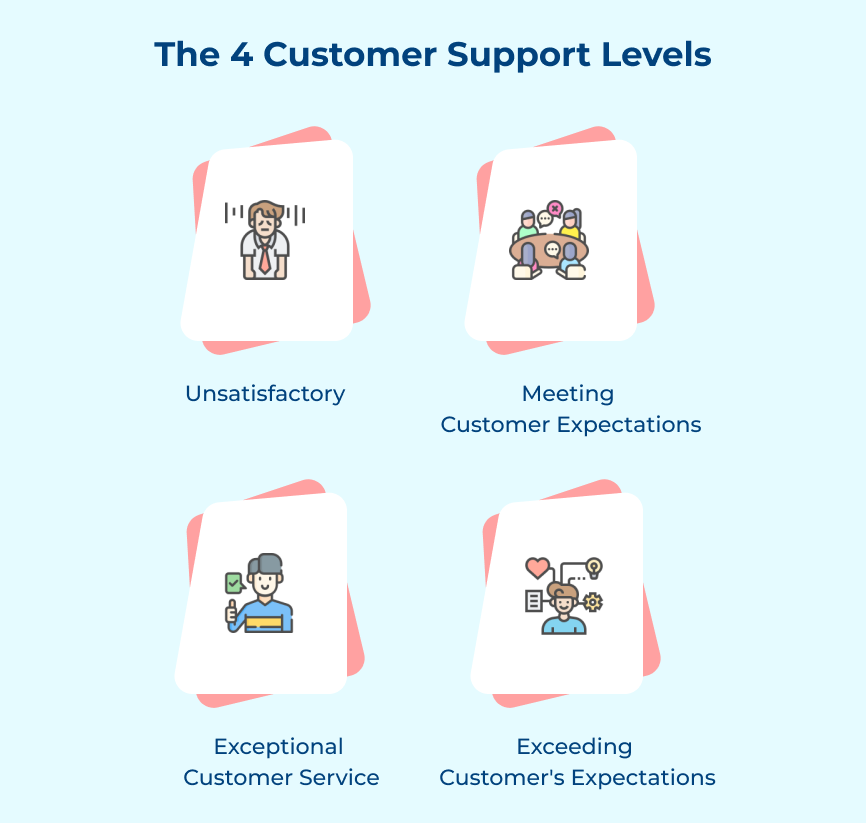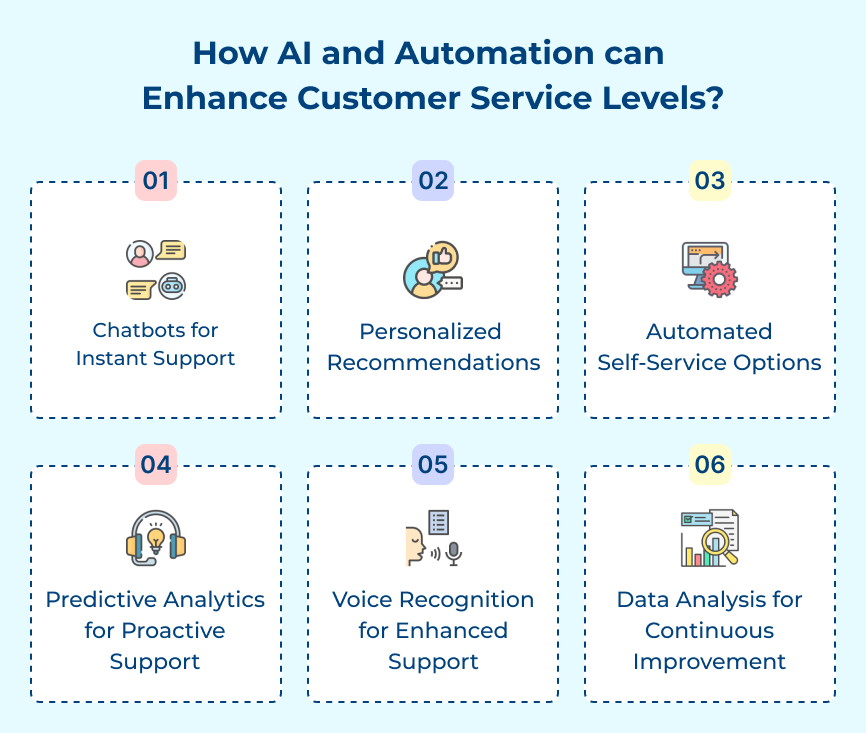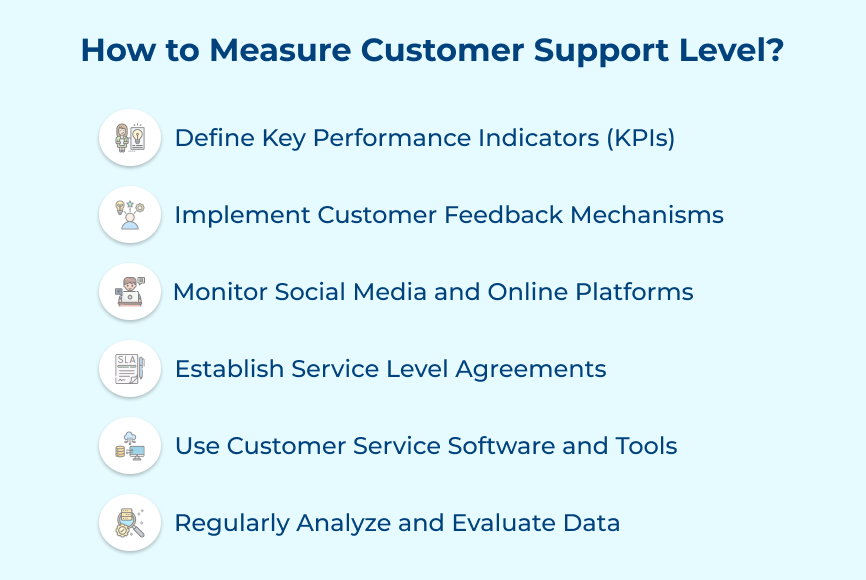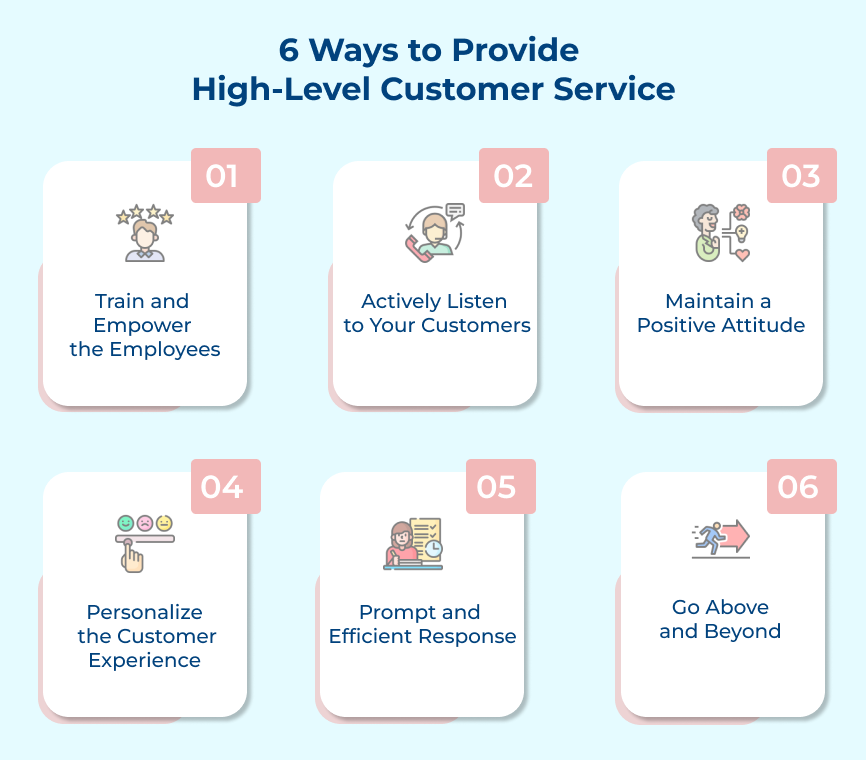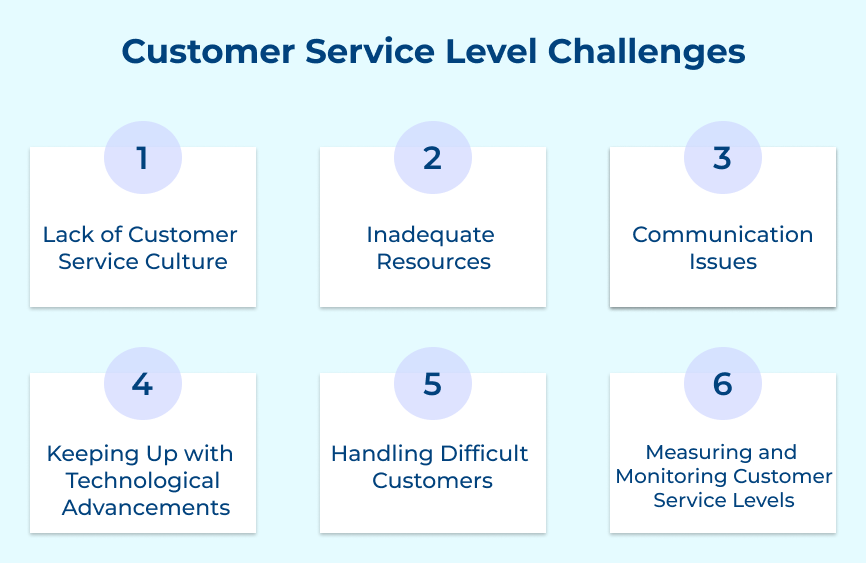1. Train and Empower the Employees
Well-trained employees are equipped to handle various customer scenarios with professionalism and efficiency. They can navigate complex situations, anticipate customer needs, and deliver personalized solutions. Empowered employees have the autonomy to make decisions and take ownership of customer interactions, which leads to higher customer satisfaction.
Consider a scenario where a customer has a technical issue with a purchased product. A well-trained and empowered employee can not only troubleshoot the problem but also offer alternative solutions or compensation options. It ensures the customer feels valued and satisfied with their resolution.
How to implement:
- Establish a comprehensive training program that covers customer service skills, product knowledge, and effective communication.
- Encourage employees to ask questions and provide continuous feedback.
- Empower them to make decisions and solve problems independently, giving them a sense of ownership.
- Facilitate a positive work culture that values teamwork, recognition, and growth opportunities.
- Regularly update training materials to keep employees informed and motivated.
2. Actively Listen to Your Customers
Listening not only involves hearing what your customers have to say, but also understanding their needs and concerns. By actively listening, businesses can go beyond simply resolving issues, and truly connect with their customers on a deeper level. It shows that you value their opinions and are genuinely interested in solving their problems.
Let’s say you own a restaurant and a customer mentions that the portion sizes are too small. Actively listening to the feedback will enable you can adjust the portion sizes and meet the expectations of the customers. It will eventually ensure their better satisfaction and loyalty.
How to implement:
- Give full attention and focus on what your customers are saying.
- Show empathy and understanding by acknowledging their concerns or questions.
- Use open-ended questions to encourage them to share more details.
- Take notes and summarize their main points to ensure you understand their needs.
- Provide personalized solutions and follow-up to ensure their satisfaction.
3. Maintain a Positive Attitude
Maintaining a positive attitude is crucial when it comes to providing top-quality customer service. Not only does it create a welcoming and friendly atmosphere for customers, but it also has a direct impact on their overall experience. A positive attitude can help diffuse difficult situations, enhance problem-solving abilities, and leave a lasting impression on customers. It also sets the tone for a positive relationship between the customer and the company.
Imagine a customer calling a customer service hotline with a complaint. Instead of being met with a defensive or negative response, they are greeted by a representative who actively listens, remains empathetic and maintains a positive attitude. The representative acknowledges the customer’s concerns, takes ownership of the issue and offers a solution.
How to implement:
- Adopting a mindset that focuses on customer satisfaction and problem-solving.
- Practice active listening and empathy, genuinely addressing customer concerns.
- Show gratitude for their business and be responsive in your communication.
- Stay calm even in stressful situations and always maintain a professional demeanor.
- Seek feedback and continuously improve your skills to offer exceptional service.
4. Personalize the Customer Experience
Personalization goes beyond simply addressing customers by their names; it involves tailoring your products, services and interactions to meet their specific preferences. Personalization is important because it makes customers feel valued, leading to increased customer loyalty and repeat business.
Let’s assume an online retailer uses past purchase data to recommend relevant products to individual customers. It not only helps the customer find what they’re looking for but also enhances their overall shopping experience. Another example is a hotel that offers personalized welcome messages or surprise upgrades based on a customer’s previous stays.
How to implement:
- Gather customer data to better understand their preferences and needs.
- Utilize this information to tailor your interactions and recommendations.
- Train your customer support team to actively listen and empathize with customers.
- Use technology like CRM systems to track customer interactions, ensuring consistent and personalized experiences across all touchpoints.
- Regularly seek customer feedback and make improvements based on their suggestions.
5. Prompt and Efficient Response
When it comes to offering top-quality customer service, one crucial aspect that should never be overlooked is prompt and efficient response. Timely and effective communication with customers not only ensures their satisfaction but also plays a significant role in building a strong loyal customer base.
Prompt response shows customers that you value their time and concerns. It establishes trust and demonstrates your commitment to addressing their needs swiftly. Imagine a customer reaching out with a query or complaint. If you respond promptly, acknowledging their issue and providing a solution, the customer will feel valued. A delayed or no response can leave them frustrated and disappointed.
How to implement:
- Establish clear communication channels, such as phone and email, to ensure customers can reach you easily.
- Prioritize quick response times by setting realistic goals for response rates and monitoring them closely.
- Utilize automation tools like chatbots or email templates for common inquiries.
- Regularly collect feedback from customers to identify areas for improvement in response time and overall service quality.
6. Go Above and Beyond
Going above and beyond means exceeding customer expectations. It can be as simple as personalized follow-up emails, offering additional assistance, or providing unexpected perks. It shows the customers that the business genuinely cares about their satisfaction. In a world where customers have numerous options, exceptional customer service sets your brand apart.
Imagine a customer who has a faulty product. Instead of just replacing it, you offer a complimentary upgrade or an extended warranty. The unexpected gesture not only resolves their problem but also leaves them feeling valued and appreciated.
How to implement:
● Truly understanding your customer’s needs and desires.
● Ensure personalized interactions, anticipate their needs, and provide tailored solutions.
● Show empathy, actively listen, and always follow up.
● Be proactive in resolving issues and be responsive to feedback.
Example of Customer Support Level
Following are the five real-life examples of brands that focused on improving their customer support levels along with insights on the impact it had on their business:
1. Zappos
Zappos is renowned for its exceptional customer service. The company’s customer support team is available 24/7 and representatives are empowered to go above and beyond to accommodate customers’ needs. The commitment to customer service has helped Zappos build a loyal customer base and differentiate itself from competitors.
Zappos’ dedication to customer support has resulted in high customer satisfaction levels and repeat business. The company has gained a reputation for delivering outstanding service, leading to positive word-of-mouth marketing and increased brand loyalty.
2. Amazon
Amazon is another example of a brand that prioritizes customer support. The e-commerce giant offers various channels for customers to reach out for assistance, including live chat, phone support, and email. Amazon’s customer service team is known for resolving issues promptly and effectively, earning the company a reputation for exceptional customer support.
Amazon’s focus on customer support has helped the company maintain high customer retention rates and attract new customers. By providing top-notch service, Amazon has established itself as a trusted and reliable brand in the e-commerce industry.
3. Apple
Apple is known for providing excellent customer support to its customers. The company offers support through its AppleCare program, which includes technical assistance, troubleshooting and repairs. Apple’s customer support team is well-trained and knowledgeable which makes sure the customers receive the help they need efficiently.
Apple’s commitment to customer support has resulted in high customer satisfaction levels and a strong brand reputation. Apple has built a loyal customer base and a positive image in the tech industry by offering reliable support.
4. JetBlue
JetBlue, a US-based airline, is recognized for its exceptional customer service. The company has implemented various initiatives to improve customer support, including a dedicated customer support team and a customer-centric approach to problem-solving. JetBlue’s commitment to customer satisfaction has helped the airline differentiate itself from competitors and attract new customers.
JetBlue’s focus on customer support has led to increased customer loyalty and positive reviews. The airline’s reputation for outstanding service has helped it maintain a competitive edge in the airline industry and attract repeat business.
5. Ritz-Carlton
The Ritz-Carlton Hotel Company is known for its luxurious accommodations and exceptional customer service. The company places a strong emphasis on customer support, training employees to anticipate and exceed guests’ expectations. Ritz-Carlton’s commitment to providing personalized and attentive service has helped it establish a reputation as a premier hospitality brand.
Ritz-Carlton’s focus on customer support has resulted in high customer satisfaction levels and repeat business. The company’s dedication to exceeding customer expectations has earned it numerous awards and accolades in the hospitality industry.
Customer Service Level Challenges
Explore the common customer service level challenges that businesses face to ensure you identify and navigate these issues for a more effective approach to customer care.
